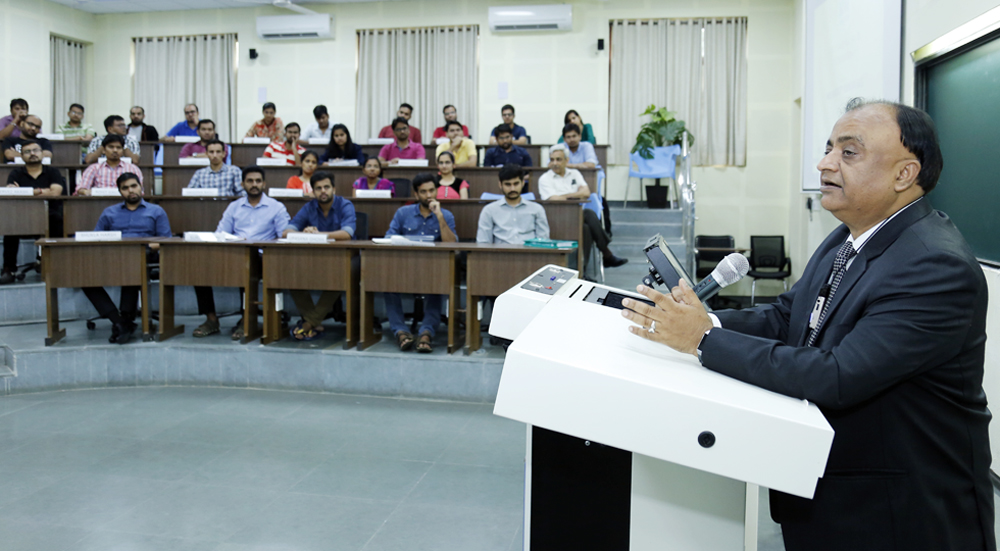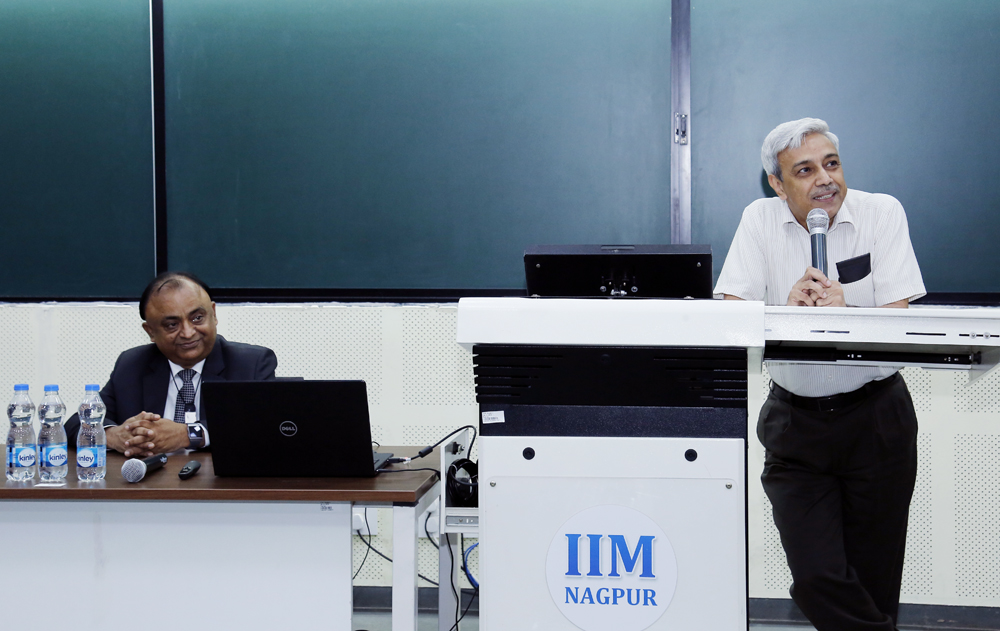
The key to success for any mission is to make efforts towards the ‘outcome’, but we run towards ‘output’, said Mr Anoop Kumar, former divisional commissioner of Nagpur. After a four and half year service as the divisional commissioner of Nagpur, Mr Kumar has been posted as the Principal Secretary for Animal Husbandry, Dairy Development and Fisheries (ADF).
Mr Anoop Kumar interacted with the students of Indian Institute of Management Nagpur on Tuesday, 21st August 2018. He spoke extensively on ‘Key Considerations in Managerial Decisions from the perspective of Government Organization’.
 In a brief, Director of IIMN Prof LS Murty shared with the students his memories of knowing Mr Anoop Kumar. “As a guide, a support system, an academic support, a moral support and an inspiration, Mr Anoop Kumar has been with us through out. He has been instrumental in helping the institute increase its capacity. He is an academician himself and a profound administrator, but beyond that he is a good human being. Today’s session will be like a window vision to managerial decision making from Mr Kumar’s point of view,” said Prof Murty.
In a brief, Director of IIMN Prof LS Murty shared with the students his memories of knowing Mr Anoop Kumar. “As a guide, a support system, an academic support, a moral support and an inspiration, Mr Anoop Kumar has been with us through out. He has been instrumental in helping the institute increase its capacity. He is an academician himself and a profound administrator, but beyond that he is a good human being. Today’s session will be like a window vision to managerial decision making from Mr Kumar’s point of view,” said Prof Murty.
Prof Saroj Kumar Pani introduced the former divisional commissioner of Nagpur to the students. He apprised the students about Mr Kumar’s contribution in establishing IIM Nagpur as what it is today. IIMN has grown in numbers as well and Prof Pani regarded Mr Kumar for his key role in it.
Mr Anoop Kumar had been an indispensable part of the Institute’s site selection committee back in 2015 and had played a proactive role in solving the space constraints for the Institute. His involvement and association with the Field Immersion Programme for PGP students is beyond just appreciation. Summing up, Mr Kumar has been like a beacon light and a dependable guardian for IIMN.
While addressing the students, Mr Kumar said that he feels to be fortunate enough to have been part of the unfolding of a national level institution like IIM.”Establishment of such institutions in this region is the beginning of development. For years, this region of India has been neglected and hence many parts have remained undeveloped and are lagging behind,” he added.Mr Kumar expressed his warmth for the region while mentioning that his four-and-half-year service in Nagpur was a wonderful journey. “I have been part of many developmental projects and have initiated many ventures. But have also closely noticed the enigma of Maharashtra. When I was at Buldhana district, I was surprised to see the region lagging way behind. When compare to the picture at Kolhapur, Satara or other parts of Western Maharashtra, this part of the state seems completely different,” he exclaimed.
Then Mr Kumar asked the students to think and answer on why this region has not been selected for economic growth. Why is Western Maharashtra considered more when it comes to logistics and manufacturing?
One of the students answered that the reason was the geography of the region. Western Maharashtra was close to the coast and it made transport and export easy, the student added. Mr Anoop was convinced with the answer.
“Though the central India region is known for the yield of cotton and soy crops, the cash crops are not grown here. Hence, most of the regions has remained neglected. Leaders like Atal Bihari Vajpayee have always propagated that that for the true development of the country, development of the most underdeveloped regions of the country is important,” Mr Kumar explained.
He then put the students into a small brain storming with the difference between ‘output’ and ‘outcome’. His purpose was to make the students understand that outputs is the physical result produced following the procedure; whereas ‘outcome’ is the value or impact of your work.
“Most of the national missions are dependent on the output rather than on the outcome. We have to work towards the purpose of mission,” he said.
During the discussion session, when asked about the future of the young adults of the farming community in this region who aspire to quit farming and settle in suburban areas, Mr Kumar explained the intention for their disconnect with farming. “The reason for this is disposition, misguide and no scape. The difference between Telangana and Vidarbha is the lack of entrepreneurship here,” he said.
The talk with Mr Anoop Kumar was an eye-opener for the students to dark region and the managerial lacunae. Mr Rishabh proposed a vote of thanks on the occasion while the SAC President presented a plantation certificate to Mr Anoop Kumar.

